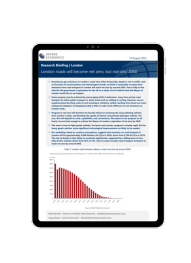London roads will become net zero, but not until 2050

In the decade before the pandemic, London enjoyed a growth premium over other major European cities. However London has faced a number of challenges which put the city under increased pressure from international rivals and we expect London’s advantage over other cities to be smaller in the future than it has been in the past. However, it will remain Europe’s largest economy.
What you will learn:
- Progress to net zero will be heavily reliant on removing the most polluting vehicles from London’s roads, and boosting the uptake of electric and perhaps hydrogen vehicles. For cars, we expect to see progress on all fronts, but not fast enough to achieve the Mayor of London’s aspiration of net zero by 2030.
- The same is true for light goods vehicles. For buses and coaches, progress is already rapid. But for heavy goods vehicles, some significant technological improvements are likely to be needed.
- Our modelling suggests that emissions on road transport in London will be approximately 4,800 kilotons (kt) CO2e in 2030, down from 8,100 kt CO2e in 2019. The rate of decline is then likely to accelerate significantly, supported by a falling share of non-fully electric vehicles (down from 65% to 5%).
Tags:
You might be interested in

Post
Forecasting the impacts of climate change is essential to meet the net zero agenda
Demand for capital goods will benefit from the large-scale investments required for countries to achieve Net Zero.
Find Out More
Post
Women in construction: Bridging the green jobs gap
Our analysis indicates the construction labour shortage will be further exacerbated by the significant increase in employment needed to achieve net zero emissions by 2050, compared to our baseline forecasts. We call these additional jobs the ‘green jobs gap’, which we estimate at 1.7 million new roles in the European construction industry. Bridging this gap will enable the additional construction work needed to deliver Europe’s 2050 climate targets.
Find Out More
Post
The Clean Growth Gap: How low carbon energy investment can transform the UK
This report sponsored by Energy UK investigates the challenges the UK faces in attracting sufficient private sector investment to finance its clean energy transition. It also details the economic benefits that transition could bring.
Find Out More
Post
How vulnerable are city economies to climate-related physical risks?
Around the world, efforts are being made to slow and eventually halt the process of climate change and reduce the social and economic threat it poses. Our various climate scenarios model that—globally, nationally, by sector, and for cities and regions. But what might happen if these goals aren’t reached?
Find Out More